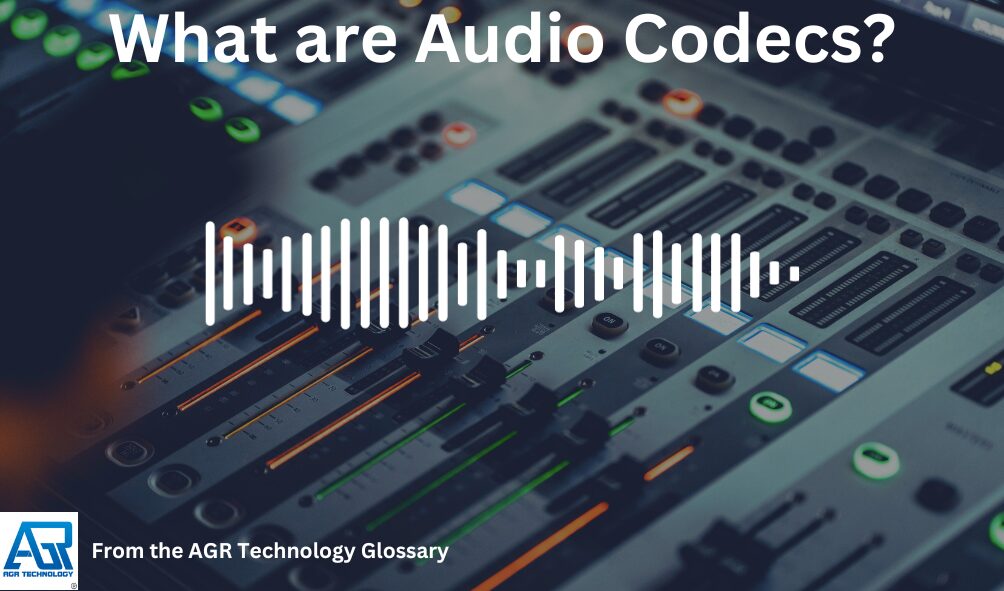What Are Audio Codecs? – Introduction

Audio codecs are essential tools in the digital audio world, functioning as the technology that allows hardware or software to encode and then decode audio content. They process audio data by compressing it for efficient storage or transmission and decompressing it upon playback or editing. This dual function gives codecs their name, derived from the words ‘coder’ and ‘decoder.’
On this page, we’ll look at the key factors behind audio codecs and how they work. In addition, audio codecs are important for a number of uses such as creating high quality audio files that can be used for a podcast and hosted using quality podcast hosting services as well as playing a large variety of different files on your computer and mobile devices.
Not all audio codecs are created equal, however. Some prioritize compressed file size for streaming and transmission, while others focus on retaining the utmost audio fidelity, often referred to as lossless compression. Depending on the needs—whether for music streaming, video editing, broadcasting, or simply listening on a personal device—a particular codec may be chosen for its specific strengths.
Key Takeaways
- Audio codecs are vital for encoding and decoding digital audio for various uses
- They balance file size and audio quality through different compression techniques
- Selection of codecs depends on the intended use, from streaming to professional editing
Fundamentals of Audio Codecs

Audio codecs are fundamental tools in digital audio technology, serving to efficiently encode and decode data for storage and transmission.
Definition and Purpose
An audio codec refers to either software or hardware capable of compressing (coding) and decompressing (decoding) digital audio. Its purpose is to reduce the file size for storage or transmission while aiming to maintain the original sound quality. Audio codecs enable the conversion between analog signals and their digital representation.
Types and Formats
There are various audio codec types and formats utilized in the industry. Lossless codecs, such as FLAC and ALAC, ensure no data loss during compression. In contrast, lossy codecs like MP3 and AAC, compress data by discarding some of it to achieve smaller file sizes.
Compression Methods
Compression methods can fundamentally change how data is stored and processed. Lossless compression manages to preserve all the original data, ensuring that the audio is identical to the original upon decompression. With lossy compression, however, some data deemed less critical to human perception of sound quality is permanently removed, creating a smaller, but altered, audio file.
Technical Aspects of Audio Codecs
Audio codecs are fundamental in digital audio handling, with technical elements such as bit rate, sampling, and compression methods dictating their performance and suitability for various applications.
Bit Rate and Sampling
Bit rate indicates how many bits of data are processed per unit of time, typically in kilobits per second (kbps). Higher bit rates generally equate to better sound quality but also larger file sizes. Sampling rate, measured in kilohertz (kHz), represents how often samples of the audio are taken. For instance, a CD-quality audio has a sampling rate of 44.1kHz, which means the audio is sampled 44,100 times per second.
Lossless vs Lossy Compression
Audio codecs utilize two main types of compression:
- Lossless Compression: This type compresses audio data without any loss of quality, allowing for precise reconstruction of the original audio. Examples include FLAC and ALAC codecs, which are preferred when audio fidelity is paramount.
- Lossy Compression: With lossy compression, some audio data is permanently discarded to achieve smaller file sizes, which can affect audio quality. MP3 and AAC are common lossy codecs that deliver good quality at more efficient file sizes.
Codec Compatibility and Applications
Different codecs are compatible with various systems and devices. For example, the AAC codec is widely supported across many platforms, delivering better audio quality at similar bit rates compared to the older MP3 format. When choosing a codec, one must consider the application, such as whether the audio is intended for streaming, which may prioritize efficient compression over fidelity, or for archival, where lossless codecs are preferable to preserve the original quality.
Frequently Asked Questions
Understanding the role and diversity of audio codecs is crucial for anyone engaged with multimedia, from casual users to professionals. These FAQs aim to clarify their usage, types, selection criteria, and importance across different platforms.
How are audio codecs utilized in multimedia?
Audio codecs are instrumental in multimedia applications as they compress and decompress digital audio to facilitate storage and transmission. Software like Windows Media Player uses codecs to play and create media files efficiently.
What distinguishes different types of audio codecs?
Different audio codecs vary by their compression algorithms and the resultant sound quality, bit rate, and file size. Some prioritize compression to save space, while others focus on preserving audio quality and as a result the file sizes can be larger.
Can you list popular audio codecs used in Windows 10?
Windows 10 commonly uses audio codecs like MP3, WMA, AAC, and FLAC. Each offers a different balance between sound quality and file size to meet various user needs.
What are the factors to consider when choosing the best audio codec?
Selecting an audio codec involves considering the audio quality requirements, compatibility with playback devices, file size restrictions, and licensing fees. High-quality codecs may require more storage space and processing power, as outlined by Audioholics.
What is the significance of audio codecs on Android devices?
On Android devices, audio codecs affect the sound quality of music streaming and Bluetooth audio, with codecs like aptX and LDAC providing higher quality over standard SBC.
How does an audio codec differ from an audio format?
An audio codec refers to the software that compresses or decompresses audio data, while an audio format is the container that holds the encoded data, including the codecs used. Understanding this distinction is critical for handling various audio files and their compatibilities.
Other related content:
What are ID3 Tags: A Clear Explanation
Source(s) cited:
Thompson, James. “What are Audio Codecs and Audio Containers: Learn Everything about Vorbis, Opus, FLAC, Speex, and ALAC” Front Space Blog, 31 Oct. 2023, front.space/blog/what-are-audio-codecs-and-audio-containers-learn-about-vorbis-opus-flac-speex-and-alac/. Accessed 13 Jan. 2024.
D. Rashid, (2021). Audio Codecs Explained for Non-Audiophiles [Online]. Audioholics Home Theater, HDTV, Receivers, Speaker. Available at: https://www.audioholics.com/audio-technologies/codecs (Accessed: 13 January 2024).
Cohen, S. What is an audio codec? A jargon-free explainer. Digital Trends. https://www.digitaltrends.com/home-theater/what-is-audio-codec-explained/. Published August 24, 2022. Accessed January 13, 2024.
![logo-new-23[1] logo-new-23[1]](https://agrtech.com.au/wp-content/uploads/elementor/thumbs/logo-new-231-qad2sqbr9f0wlvza81xod18hkirbk9apc0elfhpco4.png)